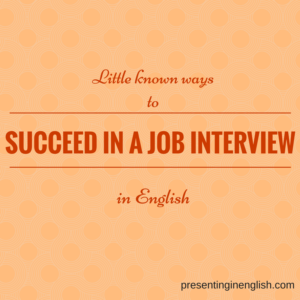
Most people are familiar with the basic interview preparation advice: arrive early, dress to impress, have a firm handshake and be prepared. However, not all job interviews are equal. Preparing for an interview in your second language can be more difficult and needs a lot more preparation.
Here is a list of some ways to help you better prepare for an interview if English is your second language.
Read the room
If you’ve done your homework, you should already know as much as possible about the person interviewing you when you arrive. However, it can be helpful to ‘read the room’ as well. This means observing the meeting room and offices for anything that you could mention that would be relevant to the interview. It could be a photo, a book or even a painting.
You can use this information to break the ice at the beginning or save the information for the end. For example, if you see a poster on the wall of a recent campaign that the company did, mention it and ask questions about it. “I saw the YouTube video you did for this campaign. Were the results positive for the company?” Mentioning something unique will help you stand out from the crowd.
This tip comes from Laszlo Bock, head of Google’s innovative People Operations. He’s recently published a book Work Rules!, that discusses his vision for attracting top talent at Google. If you want to see this tip in action, Google has created a nice demonstration video:
Prepare an introduction
Preparation is key when English is not your first language. I always recommend people prepare a short one minute introduction of themselves. It shouldn’t be simply a repeat of your CV or a biography beginning by where you grew up. It should cover the most important parts of your work experience that relate specifically to the job opening.
Once you know what you want to include, write out this introduction word for word. Many people may think this sounds like too much effort or that it may sound too rehearsed. But in this case it is better to be over-prepared. Once you have a written text, make sure you practice several times. Rehearsing a lot will make you sound confident and relaxed.
Depending on the type of job you are interviewing for, you can be quite creative with this to make yourself stand out. You could open by saying, “Here are three things that not many people know about me, but will make me an asset to your team.”
Having this ready will help you to answer one of the most common interview questions and one that employer’s like to begin with…”So, tell me about yourself”.
Prepare answer to some of the most common interview questions (and stories to support them)
I did some research into the hundreds of articles online about the ‘Top 10 Interview questions’. While each of the lists are slightly different, there is definitely a trend across the articles for the 3 most popular questions. Here they are in no particular order:
1. What are your strengths and/or weaknesses?
2. Tell me about yourself.
3. Why do you want this job?
If you don’t have much time to prepare, you should start by thinking about these three questions. Try to prepare answers that include evidence (stories). Don’t just say that you are well-organised because you use an excellent personal filing system. Use a story to prove you are well organised. Talk about how you implemented a new filing system in your last job and that it was so efficient another department also adopted the same system.
Again, rehearse these answers and the stories. As a non-native English speaker this will help you to feel more confident, present in an organised way and not be stuck for a translation of a crucial word.
Have questions to ask at the end.
Another point that came up in my research was that most lists recommended also to ask questions to the interviewer at the end of the interview. I completely agree. If the interviewer asks you, “Do you have any questions for me?” and you don’t ask anything, it may look like you didn’t prepare. This is easily fixed by having one or two questions prepared in advance. The more specific to the job you are applying for the better. Here are some examples:
- Why do you enjoy working here?
- Of all the people that held this position before, who was the best and what was the number one reason they were the best at this job?
- What is your vision for this team for the next five years?
Smile
Lastly, and perhaps most importantly, smile during the interview. There are many scientifically proven reasons why smiling is a good idea, but for me there are two main reasons why you should definitely smile during an interview.
First of all, smiling helps you to relax. When you smile, neuropeptides are released. They work toward fighting off stress, along with neurotransmitters dopamine, endorphins and serotonin. Secondly, smiling is contagious. If you smile at someone, it is very hard for them not to smile back.
With a friend try this exercise. Stand facing each other. Begin smiling at your friend while looking straight at them, after a few seconds they will probably smile back because they will feel an automatic desire to smile in response. This works with interviewers as well. Then if they smile, their mood will also be better and they will be more relaxed. A win-win strategy!
